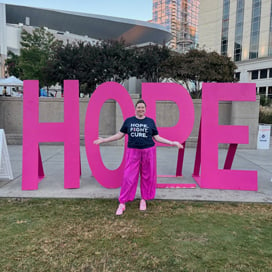Katelyn
Stage 3, ER+/HER2- breast cancer

Katelyn
Stage 3, ER+/HER2- breast cancer
In October 2023, Katelyn—a cybersecurity healthcare professional and a healthy, active 37-year-old—noticed something unusual: a small, marble-like lump in her breast. Though she had no family history and had just seen her OB-GYN in June, her instincts told her something wasn’t right.
Katelyn quickly scheduled a follow-up. Her OB-GYN, who had also delivered her daughter, ordered her first-ever mammogram. The procedure was painless, but the results were life changing. On October 30, while at work, Katelyn opened her patient portal after an ultrasound and subsequent biopsy and saw the words no one wants to read: “breast cancer”. She was alone when she found out.
What followed was a whirlwind of action. Drawing on her knowledge of the healthcare system, Katelyn quickly became her own advocate. She walked straight from her desk to the mammography clinic, obtained her imaging results on CD, and sought out recommendations for the best breast oncologist in the area.
“I have many friends in the healthcare space, and they all recommended Dr. Erika Hamilton, director of breast cancer research at SCRI and a medical oncologist at SCRI Oncology Partners,” said Katelyn. “I sought out an appointment right away. Dr. Hamilton has been an incredible leader and friend throughout my journey.”
Her diagnosis: stage 3, ER+/HER2- breast cancer—aggressive, with evidence of cancer in her left breast and the lymph nodes in her armpit. After genetic testing, it was determined her case was not genetic but instead a random occurrence.
Determined to fight back with all resources, Katelyn underwent a double mastectomy in December 2023 and began chemotherapy in January 2024. She followed with proton therapy radiation—25 sessions from June to July 2024—and enrolled in a clinical trial just one month after her final chemotherapy treatment.
“When I enrolled on the clinical trial, I had no evidence of disease. This trial has played a vital role in helping keep the cancer at bay, while also giving me more consistent access to my care team. I’ve experienced no side effects, and it’s given me something truly powerful—hope for lasting remission,” said Katelyn.
Her scans remain clear. Katelyn is participating in a clinical trial in the curative setting with no evidence of disease gaining access to a novel endocrine therapy called SERDs.
Now 39, Katelyn is using her voice to raise awareness. She was recently invited to join the executive committee for the Susan G. Komen Walk in Nashville. She is passionate about educating and dispelling myths such as “young women don’t get breast cancer” and “clinical trials are only for when you don’t have options left.”
Outside of her advocacy, Katelyn is a devoted mom to her now 9-year-old daughter, a passionate traveler who has visited all seven continents, and a dedicated dog rescuer who fosters and adopts goldendoodles. She and her family are on a mission to visit all 50 states—recently digging for dinosaur bones and even uncovering part of a duckbill dinosaur’s foot.
Katelyn’s message is clear: “I had no reason to self-check—no family history, no symptoms, just a healthy lifestyle. But I found it. And now, I have the platform and privilege to help others do the same.”
Her journey is far from over—but today, it’s one of strength, advocacy, and hope.